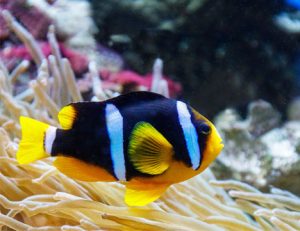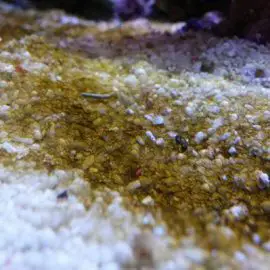Can clownfish kill an anemone?
Can clownfish kill an anemone? Unfortunately, YES.
They have an amazing symbiotic relationship, clownfish and anemones. Clownfish help to feed anemones and allow more oxygen and nutrients to circulate between the anemone’s tentacles. This occurs when they swim through them opening up the spaces between the tentacles so more oxygenated and nutrient rich water can reach them. Not only that but they are fiercely territorial, especially when looking after eggs, which in turn helps keep the anemone safe.
Anemones offer clownfish protection due to their stinging tentacles. They keep would-be predators of the clownfish at bay. For those that are small enough or unlucky enough to venture too close, they are stunned and killed by the toxic substance produced by the anemone.
Clownfish have a thick slime coat over their bodies that protect them from the sting of the anemone’s tentacles. Even so, most anemones will need to acclimate themselves to the sting of the anemones before becoming fully immune.
However, just because they have this special relationship, it doesn’t mean that all clownfish are the right match for all types of sea anemones.
Why can some clownfish end up killing an anemone and others not?
Some clownfish can get quite large and if they are particularly aggressive can end up killing an anemone due to how rough they can be. The Maroon clownfish for example, can grow up to approximately 6.5 inches in the wild. Given the space in a saltwater aquarium, they have the potential to reach this size too. They have been known to dive deep down into the mouths of anemones to steal food from them. The stress caused to the anemone can prove too much.
Clownfish that have been found to be particularly aggressive with anemones:
Clownfish are extremely territorial, especially when guarding eggs. The following is a general list of the most aggressive and least aggressive types of clownfish. Of course there will always be the exception. You may get a pair of Clark’s Clownfish that not that aggressive and similarly, you may get a pair of Common Clownfish that are very aggressive.
Most Aggressive:
-
Black Saddleback Clownfish (A. polymnus)
-
Clark’s Anemonefish/Yellowtail Clownfish (A. clarkii)
-
Mccullochi Clownfish (A. mccullochi)
-
Maroon Clownfish (P. biaculeatus)
-
Tomato Clownfish (A. frenatus)
Least Aggressive:
-
Percula Clownfish (A. percula)
-
Common Clownfish (A. ocellaris)
-
Skunk Clownfish (A. perideraion)
Just starting out in the hobby?
Get your copy of How To Set Up A Successful Saltwater Aquarium ebook today.
This ebook will help to guide you past the mistakes I have made over the years.
Tips when buying and introducing an anemone to reduce possible stress by clownfish:
In order to give your anemone a head start here are a few tips
Know what to look out for when buying an anemone. Making sure it is as healthy as possible when choosing it puts you one foot ahead of the game.
Getting an anemone that is at least double the size of the clownfish, it will stand a better chance of surviving any beating it gets from them.
If you do not already have clownfish in your tank, introduce the anemone to the tank first. This will give it time to settle in and destress before being inhabited by the clownfish.
Feeding an anemone twice a week will help it grow in size that much quicker. Of course you can end up overfeeding it so you’ll need to keep an eye on it. If it starts to expel food from it’s mouth, then reduce the amount it is being fed.
Why is my clownfish nipping at my anemones tentacles?
It is thought that clownfish nip or bite the anemones tentacles to increase their immunity to it. This is quite common behaviour and as long as you have a healthy, thriving anemone, this isn’t seen as a problem.
Conclusion
By trying most or all of the tips mentioned in this article, you will be giving your anemone a great chance of starting a healthy new beginning in your saltwater tank. The stronger they are, the more likely they are to withstand the bashing that larger, more aggressive types of clownfish can often give.

Hi, my name is Craig.
I am the owner of The Salty Side.
Firstly, thank you for visiting us. If you have found this article to be informative, and you now have a better understanding of the topic, then my job is done.
If you are feeling charitable, and feel I deserve a little thank you, I thank you in advance for any support given.







